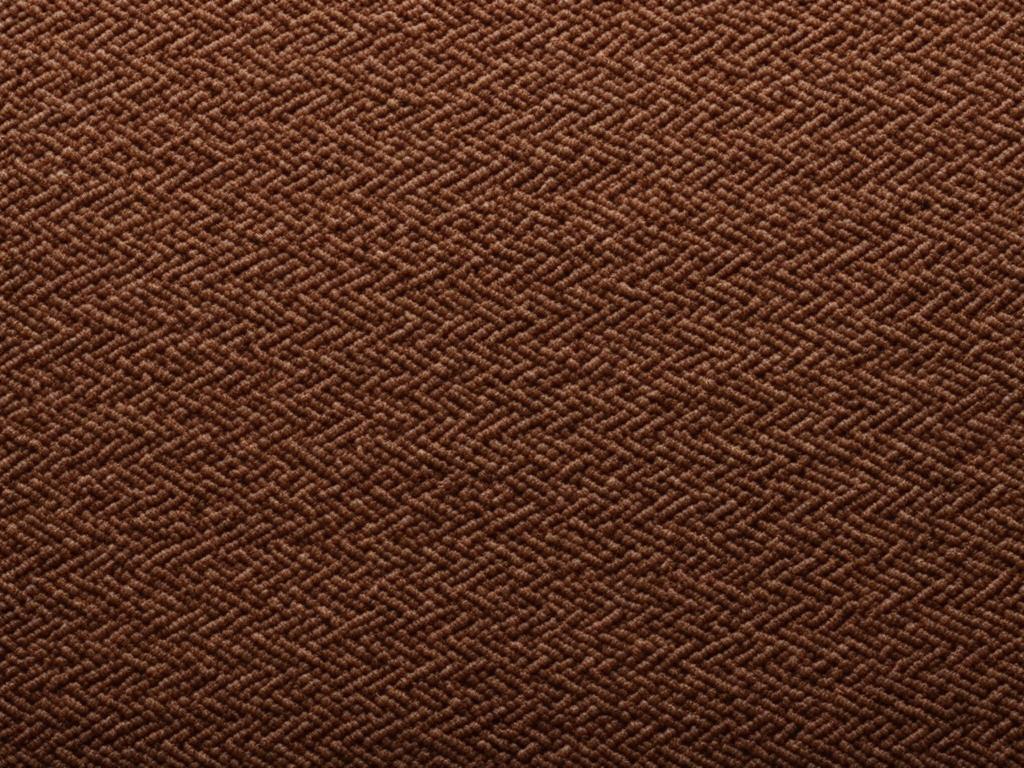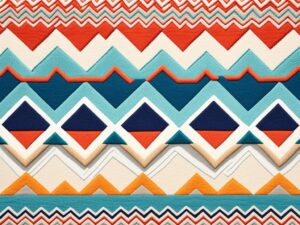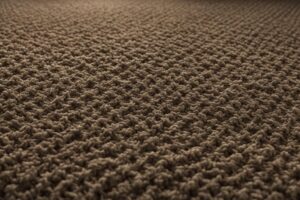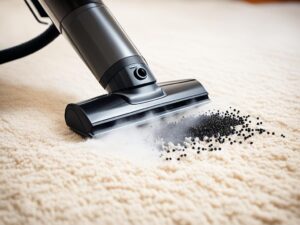After cleaning your carpet, you may notice a sticky residue that ruins the clean and soft texture. The main cause of sticky carpet is leftover residue from the cleaning process. When cleaning your carpet, chemicals and water are mixed and sprayed onto the carpet. If this process is not done correctly or rushed, soap and cleaning chemicals can remain in the carpet, leading to stickiness.
Key Takeaways:
- Sticky carpet is often caused by leftover residue from the cleaning process.
- Improper rinsing or rushing the cleaning process can leave behind soap and cleaning chemicals.
- The stickiness not only affects the feel of the carpet but also makes it attract dirt and grime.
- You can fix sticky carpet by re-rinsing with a shampooer, using vinegar, or manually scrubbing with vinegar and water.
- To prevent sticky carpet, follow all instructions carefully and consider professional cleaning services.
Understanding the Sticky Carpet Problem
The sticky feeling on your carpet can be caused by residual cleaning solutions and soap that are not properly rinsed out. This can happen when the rinse cycle is not thorough or when the cleaning process is rushed. The leftover cleaning chemicals dry into the carpet fibers, creating a sticky texture. This stickiness not only affects the feel of the carpet but also attracts dirt and grime, making it re-soil quickly.
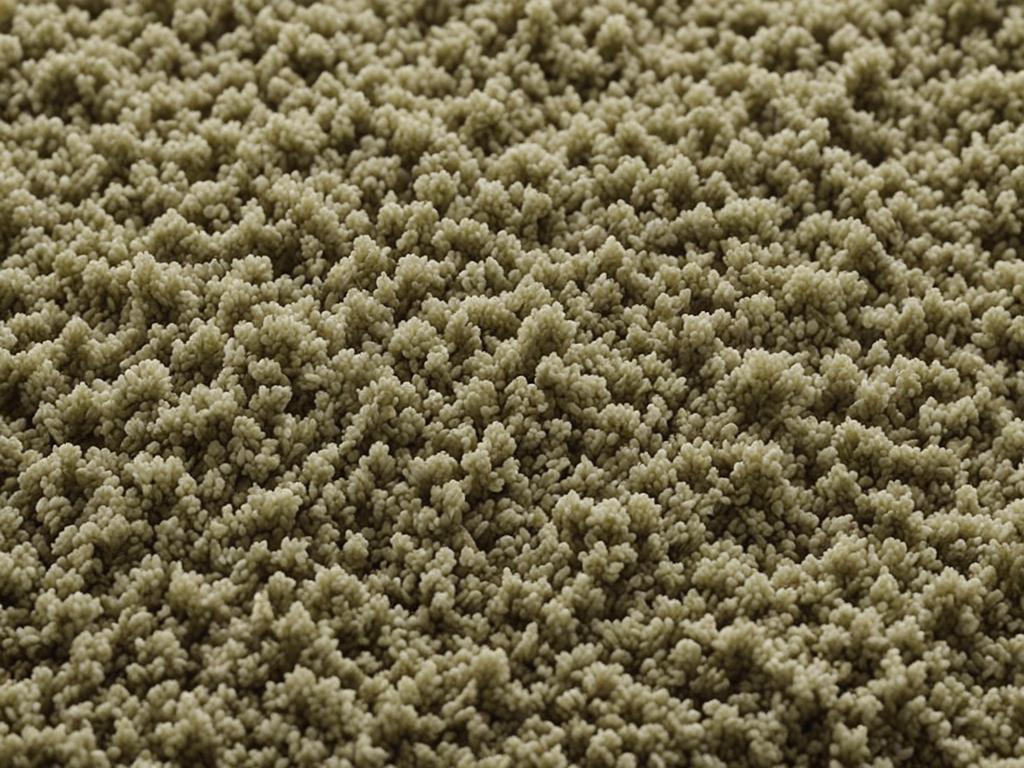
To fully grasp why your carpet feels sticky, it’s important to understand the cleaning process. When you clean your carpet, whether using a carpet cleaner or other methods, a combination of water and cleaning agents are applied to remove dirt and stains. However, if the rinse cycle is not properly executed, or if the cleaning process is rushed, some of the cleaning solutions and soap may be left behind.
These leftover residues then dry into the carpet fibers, contributing to the sticky sensation you feel when walking on the carpet. It’s important to note that this sticky residue can not only affect the texture of the carpet but also attract dirt and grime. As a result, the carpet may re-soil more quickly and appear to be dirty even after cleaning.
Solutions to Fix Sticky Carpet
When you notice a sticky residue on your carpet after cleaning, it can be frustrating. Fortunately, there are several methods you can try to remove the stickiness and restore the clean and soft texture of your carpet.
Re-Rinse with Your Shampooer
If your carpet feels sticky after cleaning, try re-rinsing it using your shampooer. Run the rinse cycle again to thoroughly remove any leftover cleaning solution that may be causing the stickiness. This method can be effective in eliminating residue and restoring the natural feel of your carpet.
Vinegar Solution
An alternative solution to fix sticky carpet is to use vinegar. Mix equal parts of vinegar and water, and then run your shampooer with the vinegar solution. The acidic properties of vinegar can help break down and remove the stickiness from your carpet fibers. Make sure to properly mix the solution and follow your shampooer’s instructions for optimal results.
Manual Scrubbing
If re-rinsing or using a vinegar solution doesn’t work, you can manually scrub the sticky spot with a mixture of vinegar and water. Create a solution using one part vinegar and three parts water, and then scrub the area in one direction using a clean cloth or sponge. Periodically soak up the water with a dry towel to prevent excessive wetness on the carpet. This method requires a bit more effort, but it can effectively remove the sticky residue.
img src=”https://seowriting.ai/32_6.png” alt=”how to fix sticky carpet” style=”display:block;margin:auto;”>
| Method | Key Ingredients | Description |
|---|---|---|
| Re-Rinse with Shampooer | Shampooer Water |
Run the rinse cycle again to remove leftover cleaning solution from the carpet. |
| Vinegar Solution | Vinegar Water |
Mix vinegar and water, and run your shampooer with the vinegar solution to break down and remove the stickiness. |
| Manual Scrubbing | Vinegar Water Cloth or sponge |
Scrub the sticky spot with a mixture of vinegar and water, periodically soaking up the water with a dry towel. |
If these methods don’t successfully fix the sticky carpet, it’s possible that the issue is not caused by residue but rather a stain. In such cases, you may need to consider alternative cleaning methods or seek professional assistance.
Prevention Tips to Avoid Sticky Carpet
To prevent your carpet from feeling sticky after cleaning, it’s crucial to follow a few essential tips. By paying attention to the cleaning process, you can ensure a residue-free and soft carpet. Here are some preventative measures you can take:
- Read the instructions: Familiarize yourself with the manual that came with your shampooer and carefully read the instructions on the cleaning solution. Following the manufacturer’s guidelines will help you understand the correct usage and avoid any mishaps.
- Mix cleaning solutions carefully: Take your time while mixing the cleaning solution. Follow the prescribed ratios and ensure that the solution is well-blended. Properly mixed solutions will help prevent excessive residue on the carpet.
- Shampoo slowly: Moving slowly while shampooing your carpet allows for a thorough cleaning process. Rushing through the process might cause inadequate rinsing, leaving behind sticky residue. Take your time and cover each area systematically.
- Rinse properly: Make sure to rinse your carpet thoroughly after the shampooing process. Use clean water and ensure that no cleaning chemicals or soap residue remains. Proper rinsing is key to removing any potential stickiness.
- Consider professional cleaning: If you’re uncertain about your cleaning abilities or want a more thorough clean, it’s worth considering professional carpet cleaning services. Professionals have the expertise and equipment to ensure an effective cleaning process and prevent any sticky residue on your carpet.
By following these prevention tips, you can maintain a clean and residue-free carpet. Taking the time to read instructions, mix cleaning solutions carefully, shampoo slowly, rinse properly, and seek professional help when needed will help you avoid the frustration of a sticky carpet.
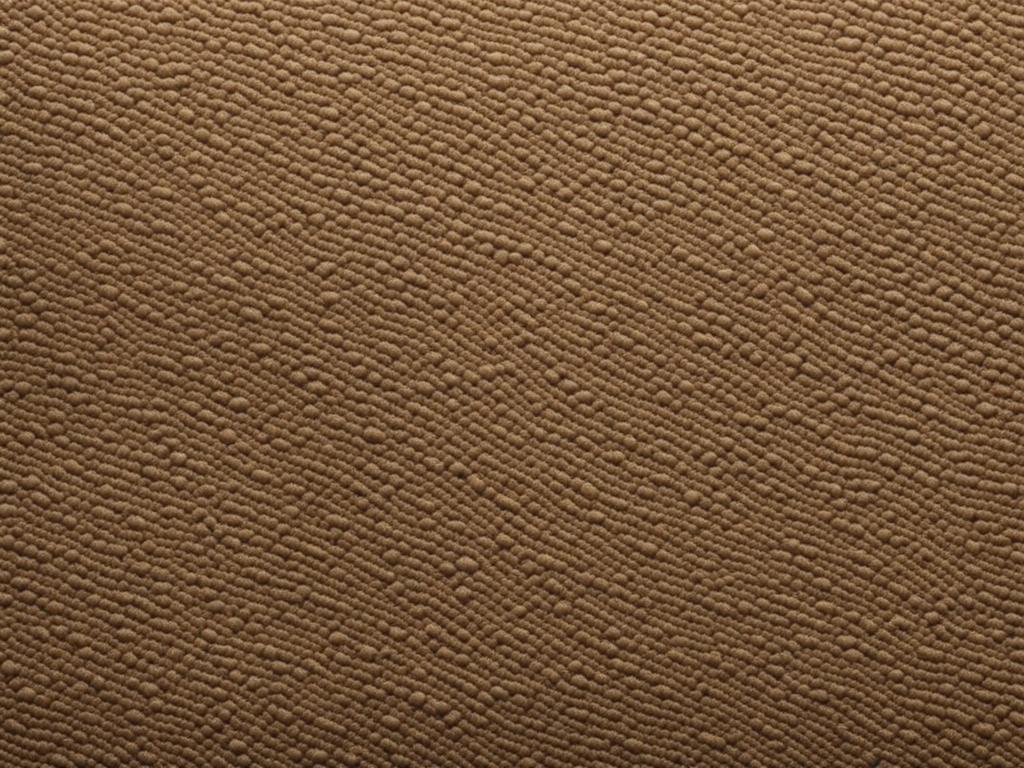
| Prevention Tips to Avoid Sticky Carpet |
|---|
| Read the instructions |
| Mix cleaning solutions carefully |
| Shampoo slowly |
| Rinse properly |
| Consider professional cleaning |
Household Solutions for Sticky Residue
If you’ve noticed that your rug feels sticky, you may be dealing with leftover residue from detergent or soap. Fortunately, there are household solutions that can help resolve this issue. One effective method is using white vinegar, which is known for its cleaning properties.
To use vinegar as a solution, you have a couple of options. You can manually dab vinegar onto the affected areas using a cloth or sponge. Alternatively, you can utilize a carpet shampooer by substituting the cleaning solution with vinegar. This allows you to evenly distribute the vinegar and ensure thorough cleaning. Just remember to follow the manufacturer’s instructions for operating the carpet shampooer.
Another household solution that can remove sticky residue is rubbing alcohol. You can apply rubbing alcohol directly to the affected areas and gently scrub using a cloth or sponge. Alternatively, you can use a spray bottle to apply the rubbing alcohol and then scrub the area. Be sure to scrub gently to avoid damaging the carpet fibers.
Remember:
- Use white vinegar as a manual solution or in a carpet shampooer.
- Apply rubbing alcohol directly or with a spray bottle.
- Gently scrub the affected areas to avoid damage.
These household solutions can effectively remove sticky residue from your rug, restoring its softness and cleanliness. However, it’s always a good idea to spot test any cleaning solution on a small, inconspicuous area of the rug first to ensure it doesn’t cause any damage or discoloration.
| Household Solution | Method |
|---|---|
| White vinegar | Manually dab onto affected areas or use in a carpet shampooer |
| Rubbing alcohol | Apply directly and scrub gently or use a spray bottle |
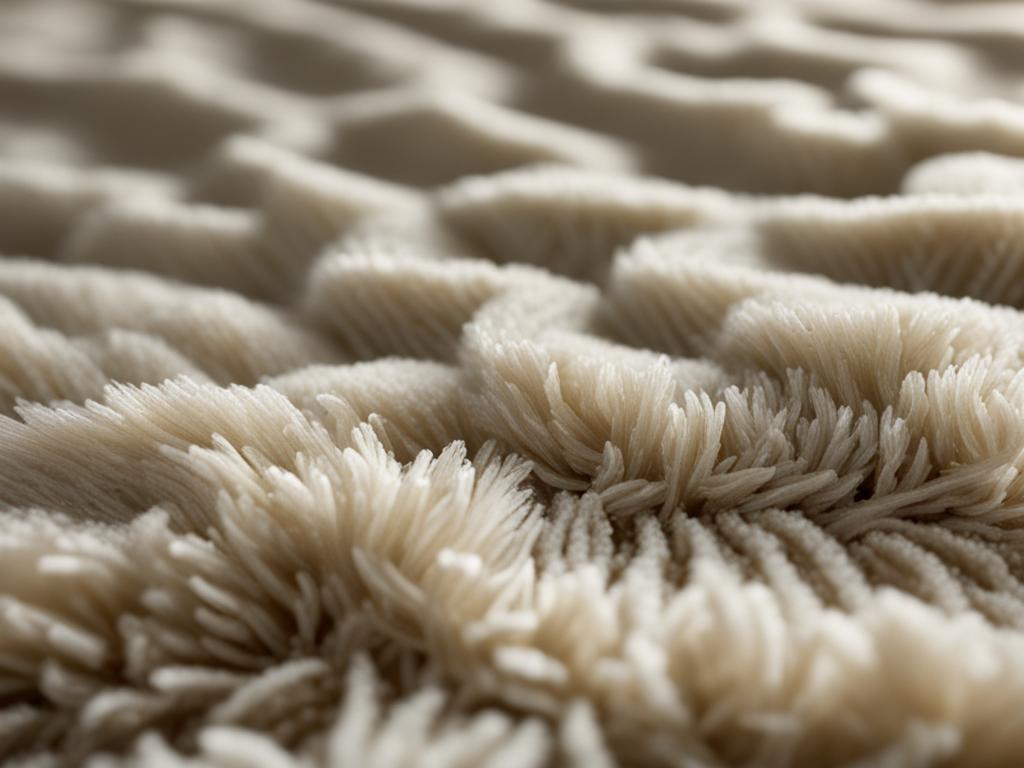
Benefits of Professional Carpet Cleaning
While DIY methods can help remove sticky residue from your carpet, it’s worth considering professional carpet cleaning services for a truly thorough and effective solution. Professionals not only have the necessary experience and expertise but also possess specialized tools and equipment to ensure a deep and comprehensive clean.
One of the major advantages of professional carpet cleaning is the complete removal of any sticky residue that might be left behind after a DIY cleaning attempt. These experts understand the science behind various cleaning products and techniques, allowing them to select the most suitable ones for your carpet’s specific needs. By using professional-grade cleaning solutions, they can effectively dissolve and remove any lingering residues that may contribute to the sticky feeling on your carpet.
Moreover, professional carpet cleaners are well-versed in the correct cleaning processes. They know how to properly rinse and extract all the cleaning agents, leaving no sticky traces behind. This ensures that your carpet not only looks clean but also feels soft and fresh to the touch.
In addition to addressing the sticky residue on your carpet, professional cleaning can offer several other benefits. By entrusting your carpet to trained professionals, you can extend its overall lifespan. Regular deep cleaning removes dirt, dust, and allergens that could potentially damage the carpet fibers if left untreated.
Furthermore, professional carpet cleaning contributes to improved indoor air quality. Carpets can trap airborne pollutants, such as dust mites, pet dander, pollen, and other allergens, which may affect your respiratory health. Through thorough cleaning, these contaminants are effectively removed, creating a cleaner and healthier environment for you and your family.
In summary, professional carpet cleaning services offer numerous benefits beyond just eliminating sticky residue. By relying on professionals, you can ensure a deep and thorough clean, prolong the life of your carpet, and promote a healthier indoor environment for everyone.
Conclusion
If you’re wondering why does my carpet feel sticky after cleaning, the answer lies in the residual cleaning solutions and soap that are not properly rinsed out. This sticky residue can be frustrating, but there are solutions available to restore your carpet to its clean and soft texture.
First, it’s important to follow proper cleaning techniques and take your time during the process. Rushing through the cleaning can leave behind soap and cleaning chemicals that dry into the carpet, creating a sticky feeling. By thoroughly rinsing your carpet, you can remove any leftover residue and prevent stickiness.
If you’re already experiencing a sticky carpet, you can try using vinegar or rubbing alcohol to remove the residue. These household solutions can be manually applied or used with a carpet shampooer. Alternatively, you may consider hiring professional carpet cleaning services. Professionals have the expertise and tools to ensure a thorough clean, removing any sticky residue and improving the overall condition of your carpet.
To avoid sticky carpet in the future, it’s essential to take preventive measures. Follow the instructions on your cleaning products, mix them carefully, and move slowly during the cleaning process. By being diligent and choosing the right cleaning methods and products, you can maintain a clean and non-sticky carpet.
FAQ
Why does my carpet feel sticky?
The main cause of a sticky carpet is leftover residue from the cleaning process. When cleaning your carpet, chemicals and water are mixed and sprayed onto the carpet. If this process is not done correctly or rushed, soap and cleaning chemicals can remain in the carpet, leading to stickiness.
What causes carpet to feel sticky?
The sticky feeling on your carpet can be caused by residual cleaning solutions and soap that are not properly rinsed out. This can happen when the rinse cycle is not thorough or when the cleaning process is rushed. The leftover cleaning chemicals dry into the carpet fibers, creating a sticky texture. This stickiness not only affects the feel of the carpet but also attracts dirt and grime, making it re-soil quickly.
How to fix sticky carpet?
There are several methods you can try to fix sticky carpet. First, you can try re-rinsing the carpet using your shampooer. Run the rinse cycle again to remove any leftover cleaning solution. If re-rinsing doesn’t work, you can use vinegar. Mix vinegar with water and run your shampooer with the vinegar solution to remove the stickiness. Another option is to manually scrub the spot with a mixture of vinegar and water. Scrub in one direction and periodically soak up the water with a dry towel. If these methods don’t work, it may be a stain rather than a residue.
How to prevent sticky carpet after cleaning?
To prevent sticky carpet after cleaning, it’s important to follow all directions closely. Read the manual that came with your shampooer and the instructions on the cleaning solution. Mix the cleaning solution carefully and take your time during the shampooing process. Moving slowly and properly rinsing the carpet can help prevent stickiness. If you’re unsure or want a more thorough clean, consider hiring a professional cleaning company.
What household solutions can I use to remove sticky residue from my rug?
If you have leftover residue from detergent or soap on your carpet, there are household solutions you can try. One effective method is using white vinegar. You can manually dab vinegar onto the affected areas or use a carpet shampooer with vinegar as a replacement for the cleaning solution. Rubbing alcohol is another solution that can remove sticky residue. You can scrub the affected areas with rubbing alcohol or use a spray bottle to apply it directly. Remember to scrub gently to avoid damaging the carpet fibers.
What are the benefits of professional carpet cleaning?
While DIY methods can help remove sticky residue, it’s worth considering professional carpet cleaning services. Professionals have the experience and tools to thoroughly clean carpets and remove any residue. They can also ensure that the cleaning process is done correctly, preventing stickiness. Professional cleaning can also help extend the lifespan of your carpet and improve indoor air quality by removing allergens and pollutants.
Why does my rug feel sticky after cleaning?
If your rug feels sticky after cleaning, it’s likely caused by residual cleaning solutions and soap. By following proper cleaning techniques, using vinegar or rubbing alcohol, and considering professional cleaning services, you can effectively remove the sticky residue and restore the clean, soft texture of your carpet. Taking preventive measures and choosing the right cleaning products and methods can help avoid sticky carpet in the first place.
